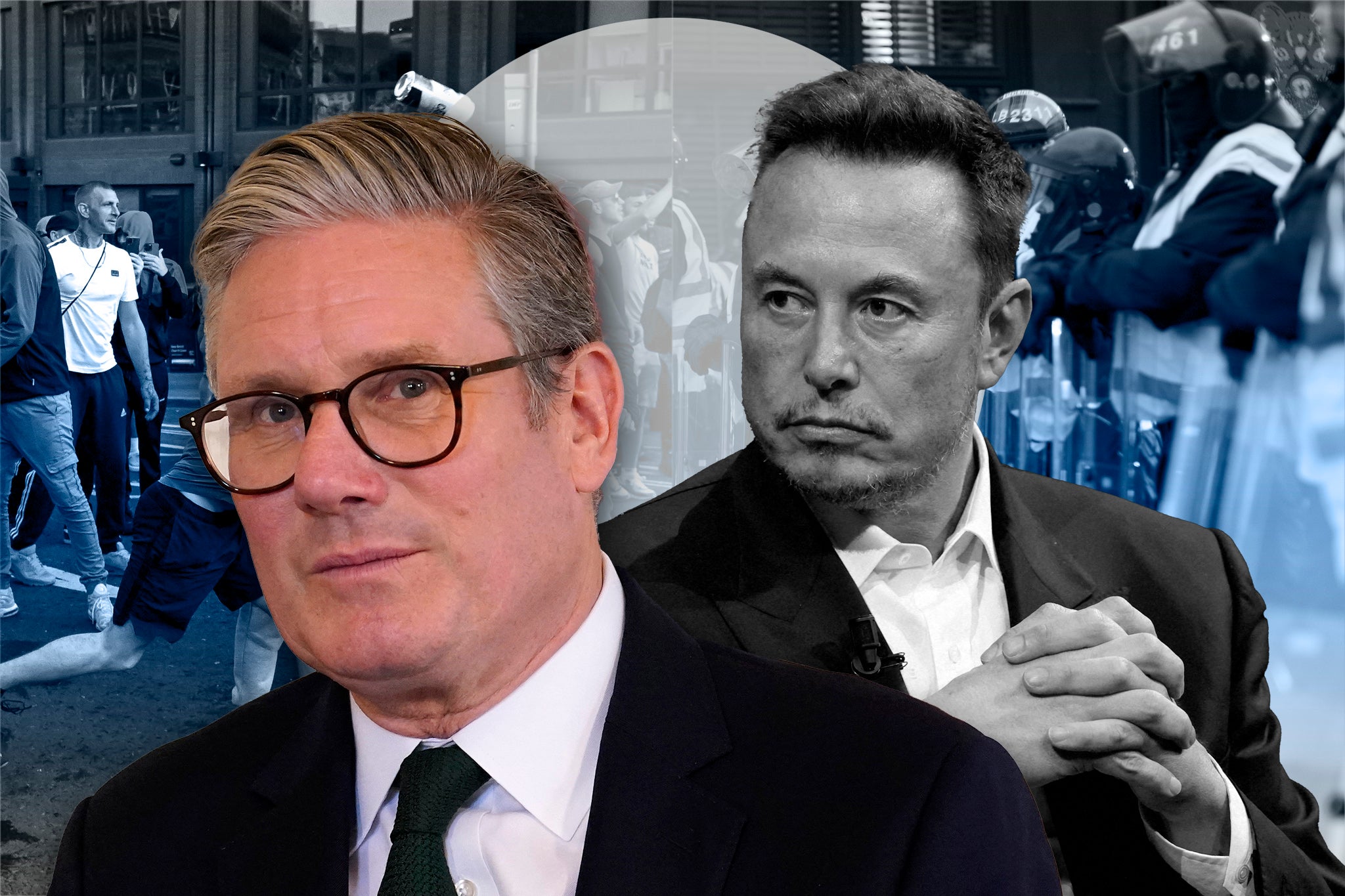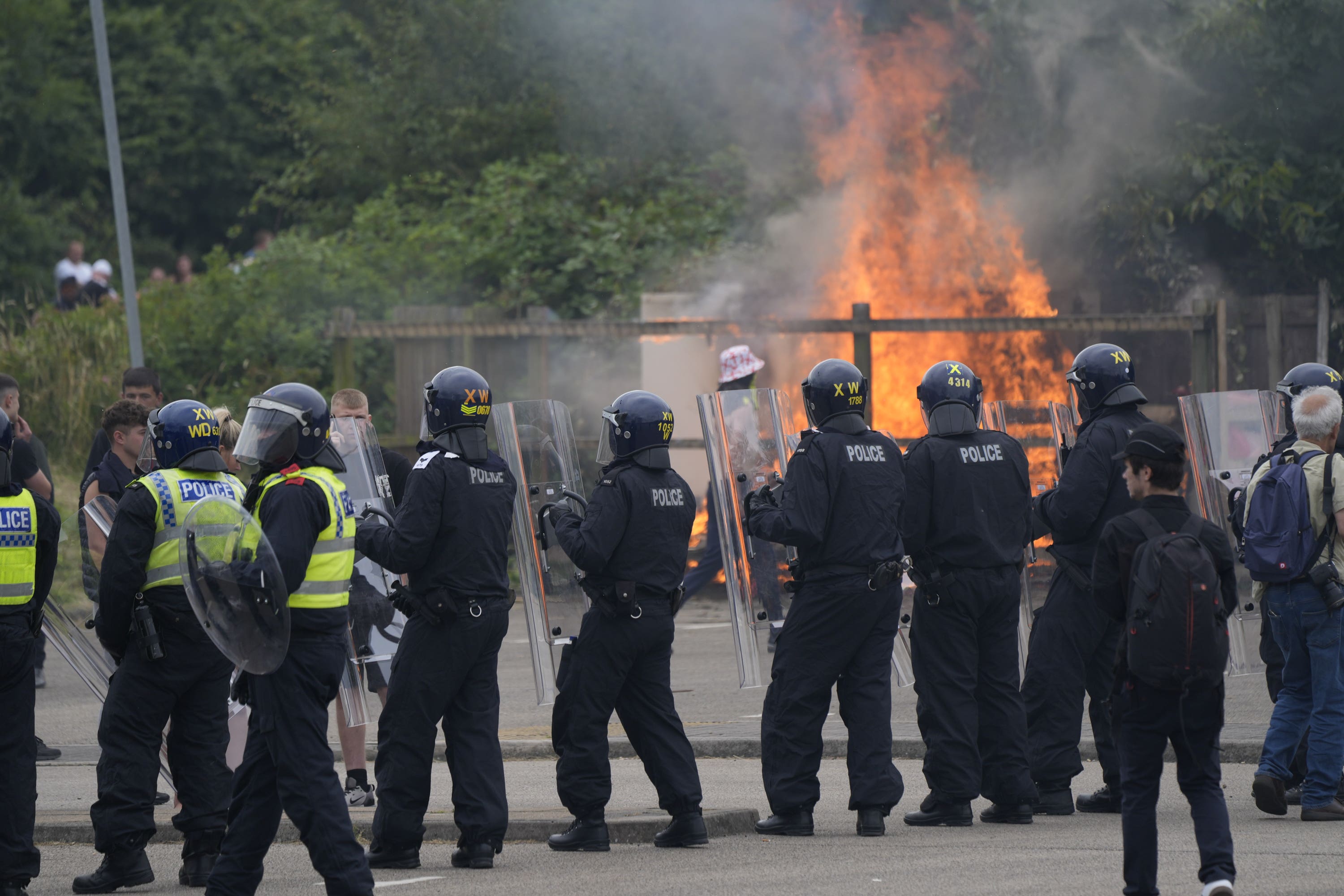Keir Starmer says Elon Musk will face the full force of the law – but how?
The entrepreneur has made a series of inflammatory comments about the riots and accused Keir Starmer of two-tier policing. But preventing Musk from using his platforms as he wishes – despite the ramifications – will be difficult, writes Chris Stokel-Walker


Elon Musk has managed to insert himself into the headlines, and into the targets of Keir Starmer and his government in the last week. The entrepreneur and owner of social media platform X/Twitter has taken potshots at Starmer and his government, claiming that the UK is in the midst of a civil war.
Musk has posted more than a dozen broadsides aimed at the prime minister and his government over their response to the Southport riots. In so doing, he’s raised the ire of ministers, who have suggested that “anyone who is whipping up violence online will face the full force of the law” – which presumably would include Musk.
As the man himself put it on X, it’s been a “busy week”.
Musk isn’t shy about courting attention. But his comments in the last week have raised the hackles of UK politicians and commentators, who are calling for authorities to take action against him.
In many ways, Musk’s public proclamations – made to his more than 193 million followers on X, the platform that he spent $44bn buying in October 2022, and which has subsequently halved in value – are not unusual.
Musk is a culture warrior and a limelight hog. He’s also always eager to prod and poke at authority, and to push the limits of decency. As Musk told his biographer, Walter Isaacson, “I’ve got a bad habit of biting off more than I can chew.”
The fights Musk picks tend to be against world leaders, with whom he appears to think he is on a similar footing. It’s not something he’s particularly wary of doing, based on historical precedent.
Musk has previously sought to play chicken with regulators around the world for a variety of different reasons. He continually needles US financial regulators, including the Securities and Exchange Commission, which sued Musk for market manipulation in 2018 after he sent a jokey tweet suggesting he would take his electric car company, Tesla, private. In 2022, he called them “b*****ds” at a conference.
With X, Musk has insulted and argued with Thierry Breton, who oversees the EU’s internal market commissioner, since his ownership of the platform was finalised nearly two years ago. He most recently arguably flouted European data protection laws by automatically opting X users into sharing their data with his AI chatbot, Grok.
And earlier this year he fought with Australia’s eSafety commissioner over that country’s Online Safety Act, when the government there sought to get X to take down violent footage of a knife attack at a church in the country.

Musk used his platform to rail against the commissioner, tweeting, “Should the eSafety commissar (an unelected official) in Australia have authority over all countries on Earth?”.
The pattern will be recognisable to Starmer, who is facing many of the same broadsides for his attempts to bring Musk to heel because of his divisive comments.
But can anything be done to tame Musk and the platform he treats as his personal fiefdom?
“The government will have to make some tough policy choices in deciding how to enforce applicable laws,” says Catalina Goanta, associate professor in law at the University of Utrecht. “Hundreds of rioters have been arrested for engaging in violent crimes, with many more yet to be identified.”
“England and Wales have long had very broad criminal offences that make it illegal to say something online that would often be legal offline,” says Michael Veale, associate professor in technology law at University College London. “Those communications offences are the tools that law enforcement usually reach for when dealing with specific cases like Musk’s, prosecuting thousands a year.”
Musk is a culture warrior and a limelight hog. He’s also always eager to prod and poke at authority, and to push the limits of decency
And some of those rules have been bolstered by the new Online Safety Act, which was passed into law in the last few months. But there’s a catch. “Even in the new act, these do not extend outside of the jurisdiction, meaning it would be hard to see how they could be used to target Musk,” says Veale.
Because Musk’s X is based in the United States, and Musk was born in South Africa and became a US citizen in 2002, he’s not subject to the act.
Besides that, Musk has carefully crafted what he’s said to divide people, but to not fall foul of the Online Safety Act. The act was watered down during its passage through parliament to rule out harmful but legal speech from being regulated. This means that sending threats of violence, like “I will wage civil war” is illegal, but saying – as Musk has done – that “civil war is inevitable” is not.
“Although he has been posting increasingly unhinged comments on his platform, it might be difficult to interpret them as incitement to violence,” says Goanta.
Another issue that will stymie any attempt to punish Musk is that while the Online Safety Act has become law, with Ofcom tasked with enforcing it, is being staggered into operation.

Ofcom did not immediately respond to a request, but has told technology publication UKTN this week that it will take until 2026 for all the elements of the act’s enforcement to be complete. The regulator’s spokesperson also told UKTN that it would have to consult “codes of practice and guidance” before sanctioning social media companies for hosting dangerous content.
They also were clear that this “will not involve us making decisions about individual posts or accounts”.
It puts the UK government, and its chosen regulator, in a sticky situation. “As the rest of the act is not designed to respond to particular pieces of content, and much of it has not been commenced yet, police would have to get very creative with other offences,” says Veale.
One of those routes could be the Communications Act of 2003, which regulates communication offences, says Lilian Edwards, professor of law at Newcastle University. “Prosecuting people abroad is a judgement call,” she says. “It has impacts: if they arrived in the UK at any point they could be seized and similarly any assets in the UK.”
Taking down X has been one idea mooted by some, but could potentially backfire, says Goanta. “Social media has definitely played an important role in disseminating information about the riots, such as conspiracy theories, but it also may serve an evidence-seeking purpose for the arrests,” she explains. “All platforms that facilitate illegal content – not just X, but also Telegram or TikTok, where a lot of lives were monetised during the riots – should be scrutinised for their content moderation activities.”





Join our commenting forum
Join thought-provoking conversations, follow other Independent readers and see their replies
Comments